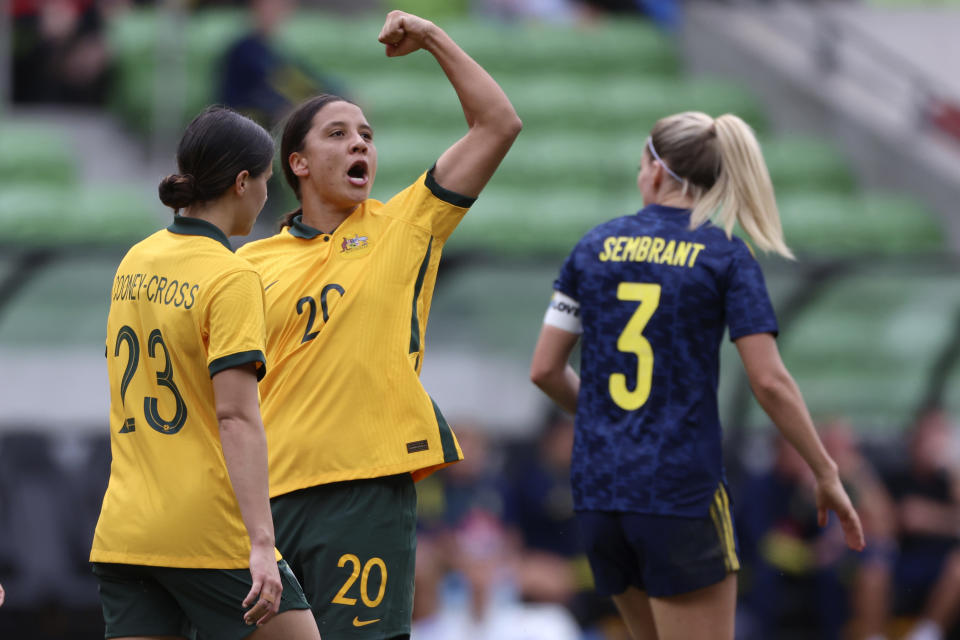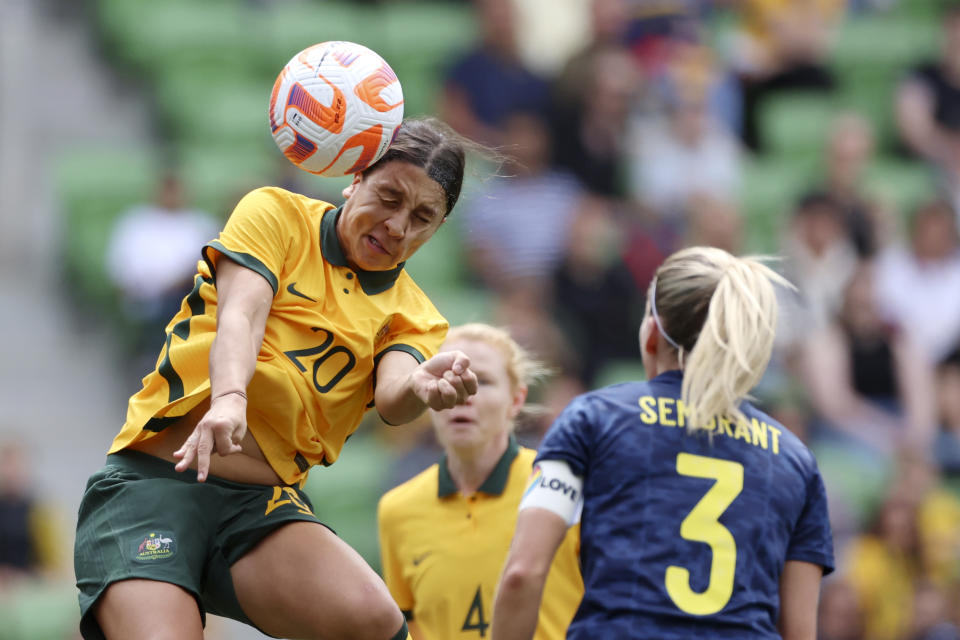Sam Kerr was an Aussie rules reject. She's now the Australian face of the Women's World Cup
- Oops!Something went wrong.Please try again later.
- Oops!Something went wrong.Please try again later.
- Oops!Something went wrong.Please try again later.
- Oops!Something went wrong.Please try again later.
BRISBANE, Australia (AP) — When Sam Kerr was told she could no longer play for her chosen Australian rules team, she went searching for another kind of football.
A preteen reject from the homegrown game — because she wasn’t allowed to play with the boys anymore — Kerr has become one of Australia’s most recognizable athletes, and is the face of the first Women’s World Cup in the Southern Hemisphere.
She’s already on the cover of FIFA 23 and shares the top rating in the update released in time for the tournament in Australia and New Zealand.
Her somersaulting goal celebrations have become synonymous with the growth of women’s soccer in Australia, where she’s the country's all-time leading scorer in international soccer, and in the England-based Women’s Super League, where she’s a star for Chelsea’s title-winning team in the league and FA Cup.
She saves the backflip mainly for the big occasions, and she's refined it since scoring her first international goal in 2010 against South Korea, when the execution wasn't quite as polished.
The fitter, faster and more experienced Kerr has incredible balance and poise at pace. She can launch powerful strikes from long range or use her deft touch and reflexes to score from close. She's strong in the air and her headers make her a major threat in front of the net.
Kerr describes herself as an instinctual player: "I just play what I see, or play what I feel. And I think it's always evolving.”
This will be Kerr's fourth World Cup, but by far her most important. A rare miss in a penalty shootout loss to Norway in the round of 16 in 2019 has given Kerr added motivation.
“I love being in a (place) where one or two moments can change the path, your career really,” she said at Australia's squad announcement. “And I think this World Cup is one of those moments.”
The 29-year-old striker wants to leave a legacy for younger players and strives for what Australians collectively know as a Cathy Freeman moment.
Freeman lit the cauldron to open the Sydney Olympics in 2000 and, carrying the full expectations of the host nation, went out the next week and won gold in the 400 meters.
“I was only 7 years old and I understood,” said Kerr, who watched that race on TV. “She walked into that stadium and every single person stopped to watch her.”
When she leads the Matildas out for their Group B opener against Ireland on July 20, at the same stadium where Freeman triumphed, there'll be 80,000 in the venue and millions more Australians watching with great expectations.
The Matildas haven’t progressed past the quarterfinals in seven previous trips to the World Cup but public hopes here are soaring.
“It would be the ultimate dream,” Kerr said. “That’s why I do what I do every day. That’s why I sacrifice so much — to win a World Cup.”
Moya Dodd, who played for the Matildas in the 1980s and 90s and later became one of the most influential women in world soccer as a member of FIFA's executive committee, said Kerr "was always good, but she’s gone from good to lethal."
“If you asked anyone on the street to name an Australian footballer right now, they'd say Sam,” Dodd added, highlighting the rising profile of the national women's team. “Ten years ago that would have been a stretch of the imagination."
Kerr's mother, Roxanne, said it might have been different if the local Aussie rules competition in Perth allowed girls to play in mixed teams with boys beyond the age of 12. Daniel Kerr, Sam's older brother, had a long professional career with West Coast Eagles in the Australian Football League. Her father, Roger, also played at an elite level.
When that career path appeared to close, the family convinced a 12-year-old Sam to give soccer a shot and it wasn't too long before a talent scout saw her play and invited her to practice with a state representative team.
After politely declining the offer initially, Kerr changed her mind and her career took off at an astonishing pace — making her international debut for Australia as a 15-year-old winger with enormous potential.
It all happened so organically that Kerr didn't even give her parents notice she'd been picked to make her international debut against Italy in Australia's capital in February 2009.
Roxanne Kerr recounted: “I’m like, ‘Why didn’t you tell any of us?’ and she said, ‘Oh, you know Mum, it’s no big deal.’”
It was a big deal then, and a bigger deal now.
Kerr has been a star at big clubs in the U.S. and Britain, has accumulated 120 international caps heading into the World Cup and, as captain and inspirational leader, represents the here and now of the Matildas.
Tom Sermanni, who was Matildas coach in Kerr's early days, described her as “just fearless.”
“When you talk about the Matildas, you automatically talk about Sam Kerr,” Sermanni told the FIFA Icons series. "She’s the face of the team. The face of Australian women’s football.
“She encapsulates the Australian spirit — she’s a fierce competitor but she looks like she’s enjoying herself.”
If there's laughing or mucking around, Kerr agreed, “I'm normally right in the middle."
But she's always alert at the business end.
As Kerr's long-time Matildas teammate, Arsenal forward Caitlin Foord, said: “She can do it all. We know we just have to find her in the box.”
___
More AP soccer: https://apnews.com/hub/soccer and https://twitter.com/AP_Sports


